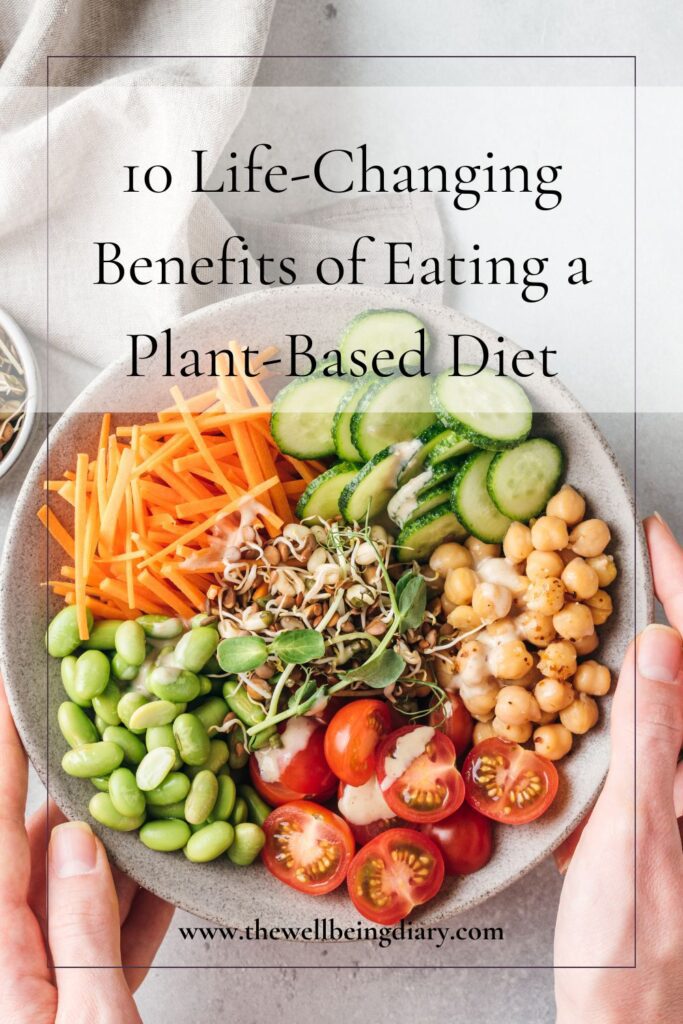10 Life-Changing Benefits of Eating a Plant-Based Diet

Key Takeaways
What are the benefits of a plant-based diet?
A plant-based diet supports heart health, boosts energy, aids weight loss, and reduces disease risk. It also benefits the environment by lowering carbon emissions and conserving resources.
In recent years, the plant-based diet has gained significant attention, and for good reason. More than just a passing trend, this way of eating offers a multitude of benefits, from improving overall health to reducing environmental impact. Whether you are looking to enhance your well-being, support ethical food choices, or embrace a more sustainable lifestyle, a plant-based diet can be a game-changer.
This article explores ten benefits of adopting a plant-based diet, shedding light on why more people are making the switch.
1. Supports Heart Health
One of the most well-documented advantages of a plant-based diet is its positive impact on heart health. Research consistently shows that consuming more plant-based foods—such as fruits, vegetables, legumes, and whole grains—can lower cholesterol levels, reduce blood pressure, and decrease the risk of cardiovascular diseases. Unlike diets high in animal products, which often contain saturated fats and cholesterol, a plant-based diet is rich in fiber and heart-healthy fats that help maintain optimal cardiovascular function.
A diet centered around plant-based nutrition can reduce inflammation and improve arterial health, reducing the likelihood of heart attacks and strokes. Many people who transition to a plant-based lifestyle report improvements in blood circulation and overall heart function.
2. Encourages Healthy and Sustainable Weight Loss
A plant-based diet can be an effective approach to sustainable weight loss. Unlike restrictive fad diets that often lead to temporary results, a diet rich in whole, plant-based foods helps regulate metabolism, curb cravings, and promote long-term weight management.
Plant-based foods tend to be lower in calories and higher in fiber, which helps individuals feel full and satisfied without overeating. Since fiber slows digestion, it promotes stable blood sugar levels and reduces the risk of insulin resistance, a major factor in obesity and type 2 diabetes.
By eliminating highly processed foods and focusing on nutrient-dense whole foods, people can experience natural weight loss while still enjoying satisfying meals.
3. Enhances Gut Health and Digestion
The gut microbiome plays a crucial role in overall health, influencing everything from digestion to immune function. A plant-based diet supports a thriving gut microbiome by providing essential fiber, prebiotics, and a wide variety of nutrients that promote beneficial gut bacteria.
Plant-based foods such as leafy greens, legumes, nuts, and seeds contain high amounts of fiber, which aids digestion, prevents constipation, and supports overall gut health. A well-balanced gut microbiome has been linked to improved mood, mental clarity, and even a reduced risk of certain diseases.
4. Reduces the Risk of Chronic Diseases
A growing body of research suggests that plant-based diets are associated with lower rates of chronic diseases, including type 2 diabetes, hypertension, and certain types of cancer. The abundance of antioxidants, phytochemicals, and anti-inflammatory compounds found in plant-based foods helps protect cells from damage and reduces the risk of developing serious health conditions.
Diets rich in processed meats and high-fat dairy products have been linked to increased risks of certain cancers and metabolic disorders. By choosing plant-based nutrition, individuals can significantly improve their overall health and longevity.
5. Provides a Natural Energy Boost
Many people who switch to a plant-based diet report a noticeable increase in energy levels. Unlike diets high in processed foods and refined sugars that can lead to energy crashes, plant-based meals provide a steady release of energy throughout the day.
Whole foods such as whole grains, legumes, fruits, and vegetables supply the body with essential nutrients, vitamins, and minerals that support cellular function and reduce fatigue. When the body receives clean, nutrient-dense fuel, it operates more efficiently, leading to enhanced stamina and mental clarity.
6. Positively Impacts the Environment
The environmental impact of food choices is an increasingly important issue. A plant-based diet requires fewer natural resources—such as water and land—compared to diets high in animal products. Animal agriculture is a leading contributor to deforestation, greenhouse gas emissions, and water pollution.
By choosing plant-based foods, individuals can significantly reduce their carbon footprint and contribute to a more sustainable future. Eating more plant-based meals supports a global effort to preserve ecosystems, protect biodiversity, and combat climate change.
7. Promotes Ethical Eating and Animal Welfare
For many people, adopting a plant-based diet is not only about personal health but also about ethical eating. The industrial farming system raises concerns about animal welfare, as millions of animals are subjected to inhumane conditions in factory farms.
Choosing plant-based nutrition allows individuals to align their dietary choices with their ethical values, reducing their contribution to animal suffering and promoting more humane food production practices. Whether through vegetarianism, veganism, or simply reducing meat consumption, people can take a stand against unethical farming practices.
8. Strengthens the Immune System
A strong immune system is essential for fighting off infections and maintaining overall health. A plant-based diet provides essential vitamins, minerals, and antioxidants that support immune function.
Nutrients such as vitamin C (found in citrus fruits), zinc (found in nuts and seeds), and beta-carotene (found in carrots and sweet potatoes) play a crucial role in strengthening the body’s defenses. Additionally, the anti-inflammatory properties of plant-based foods help reduce the risk of chronic illnesses and enhance the body’s ability to heal itself.
9. Improves Skin Health and Slows Aging
The link between diet and skin health is well-established. Plant-based diets are naturally rich in antioxidants and hydrating foods that support clear, healthy skin. Antioxidants help combat oxidative stress, which contributes to premature aging, wrinkles, and skin damage.
Foods high in vitamin E, such as nuts and avocados, support skin hydration and elasticity. Meanwhile, the high water content in fruits and vegetables helps maintain skin moisture, reducing dryness and irritation. Many people who adopt a plant-based lifestyle notice a significant improvement in their skin’s appearance, texture, and overall radiance.
10. Encourages a Sustainable and Eco-Conscious Diet
A plant-based diet is one of the most sustainable ways to eat. The current food system places a heavy strain on the environment, with meat and dairy production consuming vast amounts of water, energy, and land. By shifting toward plant-based foods, individuals contribute to a more eco-conscious diet that reduces food waste and preserves natural resources.
Eating more plants and fewer animal products helps ensure that food production remains sustainable for future generations. A simple shift in dietary choices can lead to a profound impact on the planet’s health and sustainability.
Final Thoughts
The benefits of a plant-based diet extend far beyond personal health. From promoting heart health, enhancing gut health, and supporting weight loss, to making a meaningful environmental impact and embracing ethical eating, plant-based nutrition offers a holistic approach to well-being.
Whether you are fully transitioning to a plant-based lifestyle or simply incorporating more plant-based meals into your diet, the rewards are substantial. By making small, intentional changes, you can experience firsthand the life-changing benefits of eating a plant-based diet.
FAQ
What are the main benefits of a plant-based diet?
A plant-based diet promotes heart health, supports weight loss, improves gut health, boosts energy levels, and reduces the risk of chronic diseases.
Can a plant-based diet help with weight loss?
Yes! A plant-based diet is rich in fiber and nutrient-dense foods, which promote satiety, regulate metabolism, and support sustainable weight loss.
How does a plant-based diet impact the environment?
Plant-based eating reduces carbon emissions, conserves water, and minimizes deforestation compared to diets high in animal products.
Is a plant-based diet good for skin health?
Absolutely! Antioxidants and hydrating foods in plant-based diets help combat aging, promote clear skin, and enhance overall skin health.
Does a plant-based diet provide enough protein?
Yes! Legumes, nuts, seeds, tofu, quinoa, and whole grains are excellent plant-based protein sources that support muscle health.
